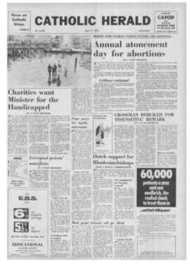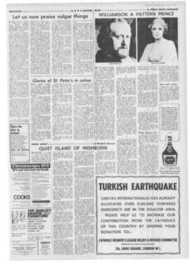Page 6, 17th April 1970
Page 6

Report an error
Noticed an error on this page?If you've noticed an error in this article please click here to report it.
Tags
Share
Related articles
The Prime Minister Lets His Hair Down
I Must Apologise To Readers Of The Charterhouse Chronicle...
Play
A New Direction In Education?
Keeping The Faith In Penal Scotland
GOVERNMENT FROM WITHIN
by The EARL OF LONGFORD
The Cabinet by Patrick Gordon Walker (Jonathan Cape 35s.)
"MR, Patrick Gordon Walker." say his pub, Ushers, "is uniquely qualified to write this study of the Cabinet."
That kind of claim is made all too often. For once it is justified. Commonwealth Secretary in Lord Attlee's Cabinet, Foreign Secretary and Secretary of State for Education in Mr. Wilson's, he writes with an authority that only an ex-Prime Minister could improve upon. And it is unlikely that any one who had been Prime Minister could muster such a judicial detachment.
Bagehot, Jennings, Mackintosh and • others have contributed invaluably to our understanding of the Cabinet But none of them could rival Gordon Walker in what he writes, for example, about the inner Cabinet : Mr. Harold Wilson in his early days as Prime Minister had an informal inner Cabinet made up of Mr.
George Brown, M r. Callaghan and myself. We met on a number of occasions at Chequers: when we came together at No. 10,
other Ministers were sometimes present.
We discussed such matters as whether to devalue, whether to raise Bank Rate, whether to impose an import surcharge. In the interval between my leaving the Cabinet in January 1965 and rejoining it in 1967 Mr. Harold Wilson had abandoned consultation with an inner group of Ministers.
The question is often asked how far are votes ever taken in the Cabinet?
Mr. Gordon Walker summarises the story from Melbourne onwards and concludes "I can recall only two occasions when noses were counted in Attlee's cabinet, once on a relatively trivial matter in order to save time. As it happens the vote was a tie and Attlee amidst general laughter gave his casting vote . . . Mr. Harold Wilson fairly frequently went round the table. On a number of occasions he openly kept his own tally of the votes pro and con; and sometimes announced the result." For the moment a definitive answer.
Herbert Morrison wrote an important book about British Government and he held as high or higher rank in the. Cabinet, but Gordon Walker makes full use of another advantage, the historical perspective of an Oxford con stitutionalist and Christ Church Don. He shows us not only how the Cabinet works but how and why it came to work that way. After quoting a description of the Cabinet as an 18th century solution of the problem that distracted the whole of the 17th century he traces the line of descent through two hundred years to the 1950s and 60s.
Coming to recent times he gives a detailed account of the developments which kd Mr. Wilson's Cabinet to abandon the British position east of Suez which is an analytical masterpice. It has taught at least one member of Mr. Wilson's Cabinet at that time to understand what was going on around him a great deal more clearly.
One cannot refrain from indicating one secondary point of difference and one self-imposed limitation. Mr. Gordon Walker is a firm monarchist and most of us will agree with his pronouncement on Page 79 "The British constitutional Monarchy by remaining unquestionably above the party political battle is assured of the loyalty and affection of Parliament, political parties and people.
But I cannot go along with him when he insists that the Crown has possessed no discretionary power whatsoever in the choice of Prime Minister even in such situations as those of 1931 (MacDonald), 1957 (MacMillan) and 1963 (Home). To take only the last case, he rightly points out that Queen Elizabeth sent for Sir Alec Douglas Home in November 1963 "on the advice of the retiring Prime Ministei."
Personally .1 respectfully agree with the course she followed, but that is not to say that no • other proceduie was constitutionally available or that all the Conservative
leaders supported her decision.
More fundamentally he could be accused of finding the present Cabinet system almost too perfect. He suggests a few relatively minor improvements but on the whole he seems well satisfied with the system as it works at the moment.
Maybe his view is correct. Yet he hiniself demonstrates that Cabinet government never stands still. He is so immensely helpful regarding the past and the present that one hopes that in a future work he will seek to pierce the veil of the future.
blog comments powered by Disqus











